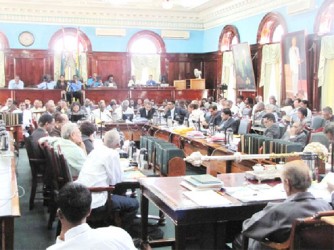Private Sector Commission (PSC) Chairman Ronald Webster and President of the Georgetown Chamber of Commerce and Industry (GCCI) Clinton Urling both believe that the perverse nature of local politics impacted negatively on Guyana’s economy last year.
Responding to questions posed to them by this newspaper the heads of two of the country’s major business support organisations (BSOs) cited the domestic political climate as the single biggest negative factor for 2013.
Webster opined that “the general impasse in Parliament” had impacted on investor confidence and had “prevented the injection of capital into the economy.” He also listed “the Amaila Falls debacle and the non-agreement on the money laundering legislation” as factors that may have impacted negatively on the country’s economy last year.

The PSC Chairman told Stabroek Business that the domestic political climate was probably likely to continue to impact negatively on the country’s economy “as it has engendered a degree of uncertainty that is detrimental to business.” Webster declared that “a perception of political insecurity results in capital flight or a stagnant economy” while “investment dollars go where they are welcomed and where the investor has a sense of security.”
And according to Urling, while the economy suffered negatively from the drop in gold prices, poor returns from sugar and the termination of Delta Airlines service to Guyana, “they all take a back seat to the incessant political rivalry that has effectively seen initiatives and institutions good for the country’s development not being not being implemented and or established.” He added that “both sides of the political divide failed to reach out and compromise on the development and execution of initiatives that would benefit the country’s economy.”
Meanwhile, Webster also opined that the recent blacklisting of Guyana by the Caribbean Financial Action Task Force (CAFTF) has reduced the likelihood of foreign investment growing in 2014.
“Even if the anti-money laundering legislation is passed and the country is taken off the blacklist, it is likely that Guyana will be viewed as a country where successive governments will not adhere to agreements, unless politicians and the media seek to reverse the negative image of Guyana as an investment haven,” he said.

By contrast, Urling said he expected “more foreign investments” to reach Guyana this year. “Our factor endowments will always attract foreign investments. However, the government has to be more proactive in this regard,” he said.
Both Webster and Urling called for the revamping of the Guyana Office for Investment (Go-Invest).
The heads of two of the country’s major business support organisations (BSOs) reported a slowdown in commercial activity in 2013 compared with the previous year.
Webster told Stabroek Business that feedback from “many businesses” suggested that 2013 was “a slow year” and that “the growth experienced by those businesses in 2012 was not sustained in 2013.”
Responding to this newspaper’s question on the overall performance of the country’s economy last year, the PSC Chairman stated that “low sugar production and the attendant drop in revenues and employment drove retail consumption down as did the sharp decline in commodity [gold] prices.”
Meanwhile, Urling in his response said that “many firms complained that their businesses experienced a slowdown in 2013. Many also complained about inflation and about the increasingly high cost of doing business.”
Webster said too that while no single initiative positively affected the country’s economy last year “a plethora of small businesses that started up, covering a wide range of services” provided a “very positive sign”.
Urling, meantime, cited “the resilience of the private sector” and in particular the gold industry as a key factor that impacted positively on the country’s economy last year. The GCCI President said that the country’s private sector had remained undeterred, “despite having to deal with a number of challenges including rising costs, stalled infrastructure projects, political wrangling, lower commodity prices, high electricity costs and lack of skilled labour.”
Asked to identify the standout sector in the country’s economy last year, Urling said that gold had again emerged as the most prominent, despite the drop in prices. He opined that prices were still attractive enough to bring more investments into the sector. He said the sector’s retention of its dominant place in the country’s economy can be attributed to the stringent official environmental oversight measures coupled with government incentives to cushion the fall in prices.
Webster, on the other hand, named the rice industry as the standout sector in 2013, alluding to the “historic levels of production,” driven in part by preferential prices from Venezuela. The PSC Chairman said that the ongoing PetroCaribe arrangement with Caracas was essential for the further development of the country’s rice industry.
Asked to identify the key challenges likely to face the productive sector this year, Urling pointed to the fact that the 20 barriers to an enhanced business environment identified in the GCCI’s Competitiveness Manifesto continue to be in place. Along with these, he named “political rivalry, high electricity and a lack of clear strategic policy” as major challenges likely to confront the productive sector this year.
Webster told Stabroek Business that the fortunes of the local productive sector were likely to hinge on “the vagaries of the global economy.” He said that while the global economy was likely to move upward this year, “beneath the market optimism” the major structural problems and imbalance that have dogged the world economy have not gone away.
Webster said that where Guyana was concerned the “slow and onerous pace of foreign transactions,” the country’s “adverse credit listing” and the price of the dollar were likely to be among the key challenges confronting the productive sector this year.
Asked about the likely fortunes of the small business sector this year the GCCI President said it would continue to experience difficulties accessing “favourable finances.” Additionally, he said small businesses still face inefficiencies as far as their “business structure and management competence” were concerned. “Both private sector organisations and the government will have to craft policies that boost small businesses’ capacity to succeed.”
In response to this newspaper’s question regarding the quality of service afforded the business sector by key state agencies, Webster said that given the centrality of its role to facilitating investment, Go-Invest needs to be “completely restructured, supported by top level private sector-oriented skills to fulfil its mandate” as a matter of urgency.
Urling, meanwhile, singled out the Guyana Revenue Authority (GRA) “for its efforts at facilitating the business community,” adding that the decision to locate all the departments into one facility was commendable though he added that the department would benefit from additional resources to render its operations more efficient.





